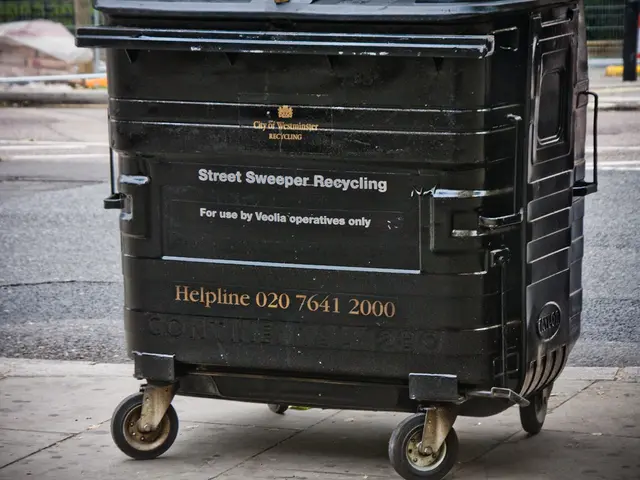Electric Vehicles and Road User Charges: A New Horizon for Australian Infrastructure
Controversy erupts over proposal for electric vehicle users to pay road tolls
As the shift towards electric vehicles (EVs) continues, the Australian government is contemplating the introduction of a national road-user charge to fund the maintenance and construction of road infrastructure. The proposed charge aims to ensure fair contributions from all road users, including EV owners [1][3].
The idea of a road-user charge has gained momentum following the High Court's ruling that state-based EV charges are unconstitutional, shifting the responsibility for such schemes to the federal government [1][2]. A key forum is scheduled to involve treasury officials and industry leaders to discuss a preferred model for this charge [1].
The Electric Vehicle Council supports the introduction of a road-user charge, but it advocates for a universal system that applies to all vehicles and is tied to emissions intensity or vehicle mass and usage [2][4]. This approach is designed to avoid creating barriers to EV adoption and to ensure that the revenue generated from the charge is allocated to improving and expanding EV charging infrastructure.
The potential impact of a road-user charge on the rollout of EV charging infrastructure is twofold. On one hand, an early implementation could deter consumers from adopting EVs, potentially slowing the demand for charging stations. High costs associated with owning an EV could discourage early adopters, impacting the overall market demand for charging stations [5].
On the other hand, a well-designed universal charge that is fair and proportional could help ensure consistent funding for road infrastructure, potentially freeing up resources for improving and expanding EV charging infrastructure. Moreover, a national charge might prompt states to invest in EV-friendly policies, including charging infrastructure, to support the transition [1][2].
The Victorian government attempted to implement a two cent per kilometre charge on EV users in 2023, but it was overruled by the High Court. The New Zealand government, on the other hand, has a road user charge scheme based on vehicle weight and distance driven, while petrol cars are also subject to the charge [3].
The Australian Electric Vehicle Association urges that any road user charge must be universal and not incentivize internal combustion vehicles over EVs [6]. The NSW treasurer Daniel Mookhey has forecasted a road user charge for EVs to be implemented by 2027/28, estimated to bring in $73 million [7].
The treasurer has been working with the states and territories "on the future of road-user charging" for EVs [8]. Coalition senator Jane Hume suggests that more needs to be done to fix ailing roads, which a broader road tax could achieve [9].
The debate surrounding road user charges for EVs is a critical step towards ensuring a smooth transition to clean transport. Balancing the implementation of these charges with other incentives will be key to fostering a thriving EV market in Australia.
- [1] ABC News, "Federal government to consider road user charges for electric vehicles," 12 May 2022, https://www.abc.net.au/news/2022-05-12/federal-government-to-consider-road-user-charges-for-evs/101008886
- [2] Electric Vehicle Council, "Road User Charging," https://evcouncil.com.au/policy/road-user-charging/
- [3] Stuff, "New Zealand's electric vehicle road user charge explained," 11 March 2022, https://www.stuff.co.nz/environment/129642385/new-zealands-electric-vehicle-road-user-charge-explained
- [4] Electric Vehicle Council, "Road User Charging Submission to the COAG Energy Council," https://evcouncil.com.au/wp-content/uploads/2021/03/RUC-COAG-Submission-Final.pdf
- [5] Green Car Reports, "Electric vehicles in Australia: A road user charge could slow their growth," 15 May 2022, https://www.greencarreports.com/news/1138883_electric-vehicles-in-australia-a-road-user-charge-could-slow-their-growth
- [6] Australian Electric Vehicle Association, "AEVA calls for a fair and universal road user charge," 20 May 2022, https://aeva.asn.au/aeva-calls-for-a-fair-and-universal-road-user-charge/
- [7] NSW Treasury, "Budget Paper 2022-23," https://www.treasury.nsw.gov.au/budget/2022-23/Budget-Paper/Budget-Paper-2022-23.pdf
- [8] The Sydney Morning Herald, "Treasurer Josh Frydenberg to consider road user charges for electric cars," 12 May 2022, https://www.smh.com.au/politics/federal/treasurer-josh-frydenberg-to-consider-road-user-charges-for-electric-cars-20220512-p5a8qc.html
- [9] The Guardian, "Jane Hume calls for broader road tax to fix ailing roads," 12 May 2022, https://www.theguardian.com/australia-news/2022/may/12/jane-hume-calls-for-broader-road-tax-to-fix-ailing-roads
- The Australian government is considering the introduction of a national road-user charge to fund infrastructure maintenance and construction, with the aim of ensuring fair contributions from all road users, including electric vehicle owners.
- The Electric Vehicle Council supports a universal road-user charge system that applies to all vehicles and is tied to emissions intensity or vehicle mass and usage, to prevent barriers to electric vehicle adoption and ensure funding for EV charging infrastructure.
- A well-designed and fair road-user charge could free up resources for improving and expanding electric vehicle charging infrastructure, potentially prompting states to invest in EV-friendly policies.
- The Australian Electric Vehicle Association urges a universal road user charge that does not incentivize internal combustion vehicles over electric vehicles, and the NSW treasurer Daniel Mookhey has forecasted a road user charge for electric vehicles to be implemented by 2027/28.




